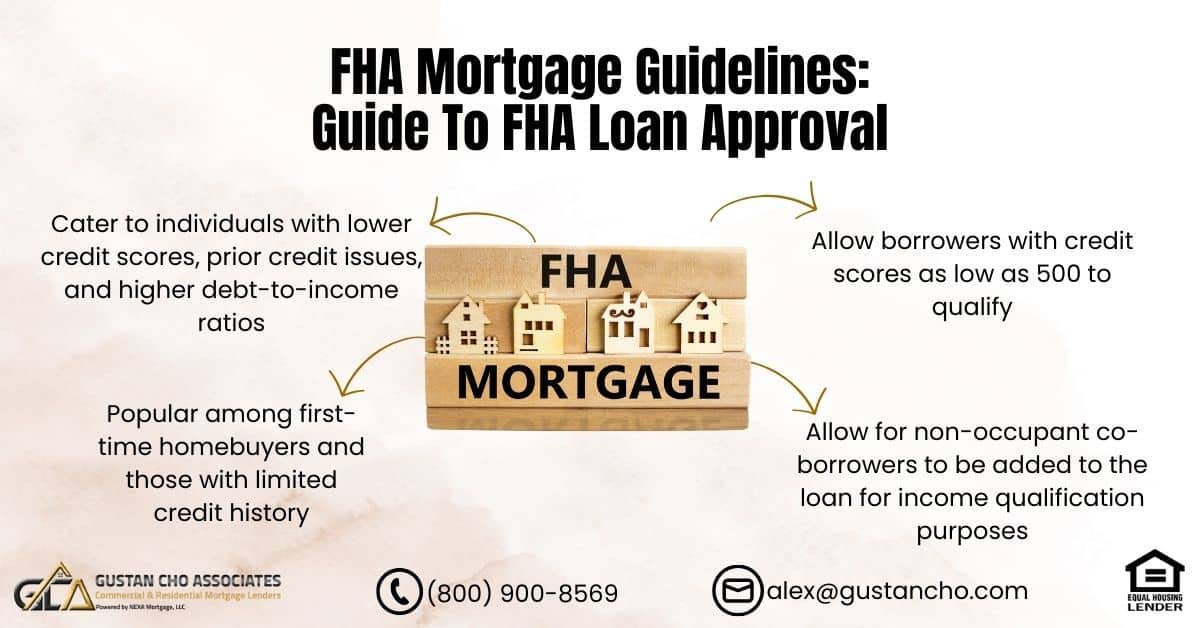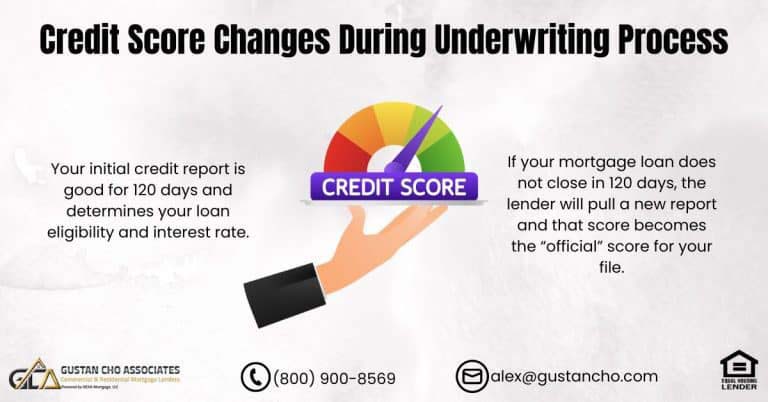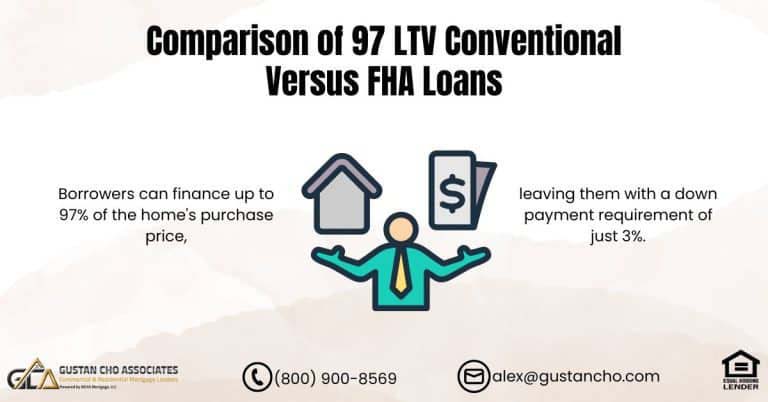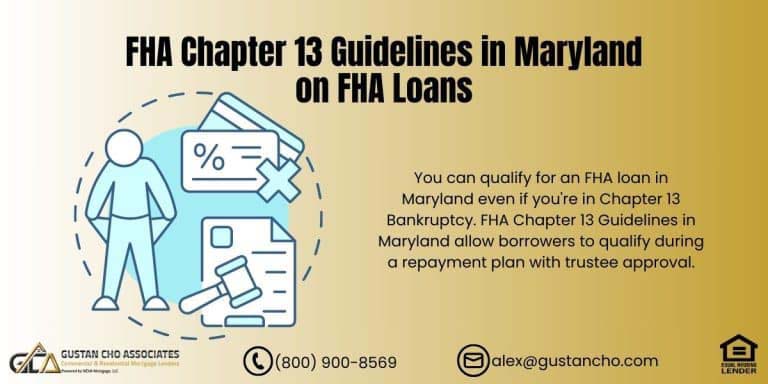FHA mortgage loans stand out as the leading choice among borrowers in the United States. The Federal Housing Administration (FHA) operates under the United States Department of Housing and Urban Development (HUD). The latest iteration of FHA Mortgage Guidelines, outlined in HUD’s FHA Handbook 4000.1, introduces significant changes.
Notably, borrowers with credit scores exceeding 620 FICO are now eligible for a maximum front-end debt-to-income (DTI) ratio of 46.9%, commonly called housing ratios. The maximum allowable back-end DTI ratio has also been set at 56.9%. Dustin Dumestre, the host of Friday’s Morning Minutes, provides insight into FHA mortgage loans, highlighting their significance:
First-time home buyers, as well as home buyers with prior bad credit, prior bankruptcy, prior foreclosure, a prior deed in lieu, and a prior short sale, can qualify for FHA loans. Mandatory waiting periods after bankruptcy and foreclosure are mandatory to qualify for FHA Loans.
This article provides an overview of FHA mortgage guidelines compared to conventional loans. Typically, conventional loans are advantageous for borrowers possessing higher credit scores, a low debt-to-income ratio, a well-established credit history, and good credit standing.
On the other hand, FHA loans offer greater flexibility and accessibility, particularly benefiting first-time homebuyers with lower credit scores or individuals facing credit and income challenges. FHA loans are particularly popular among homebuyers with low credit scores, adverse credit history, high debt-to-income ratios, and limited credit tradelines.
Trying To Qualify For An FHA Loan? Click Here.
FHA Mortgage Guidelines on Waiting Period After Bankruptcy And Foreclosure
The FHA mortgage guidelines specify waiting periods for mortgage eligibility after financial events like bankruptcy, foreclosure, deed-in-lieu of foreclosure, and short sale. For conventional FHA loans, applicants must observe a compulsory waiting period of two years after the discharge date of a Chapter 7 bankruptcy.
Similarly, there is a mandatory three-year waiting period following a foreclosure, deed-in-lieu of foreclosure, or short sale.
The waiting period clock starts from the recorded date of the foreclosure or the date of the deed-in-lieu of foreclosure that is reflected on public records. Or the date of the sheriff’s sale.
According to FHA Mortgage Guidelines, it’s important to note that the commencement of the waiting period does not coincide with the lender’s receipt of keys. Instead, the three-year waiting period begins from the short sale date for those undergoing a short sale, as indicated on the HUD-1 Settlement Statement.
At Gustan Cho Associates, we provide non-QM loans tailored to individuals who have recently experienced bankruptcy or foreclosure. Through our offerings, eligible homebuyers can secure a mortgage with just one day elapsed since the bankruptcy or foreclosure event, provided they make a down payment of 30%.
FHA Loans With Collection Accounts
Individuals with previous credit issues can still qualify for an FHA Loan, according to the FHA mortgage guidelines. You remain eligible even with outstanding collection accounts, charge-offs, and judgments. Notably, HUD, the governing body of the FHA, does not mandate the settlement of old collection accounts for loan approval and mortgage closure.
It’s essential to note that while FHA mortgage guidelines are lenient, some lenders impose additional criteria known as lender overlays. John Strange from Gustan Cho Associates provides insights into the concept of lender overlays.
Gustan Cho Associates is affiliated with wholesale partner lenders with no overlays. We only go off the minimum HUD Agency Guidelines. All we go off are the findings of the automated underwriting system (AUS) with zero lender overlays. If HUD says no collections need to be paid off, no collection accounts must be paid off.
Lender overlays are the lender’s guidelines above and beyond the minimum FHA mortgage guidelines for lending. Most lenders do require unpaid collections to be paid off before closing. The reason most lenders have overlays on collections and charged-off accounts is that they are afraid that collection agencies may pursue judicial proceedings.
FHA Mortgage Guidelines On FHA Loans With Medical Collections
FHA mortgage guidelines does not count unpaid medical collection accounts. Medical collections and charged-off accounts (medical or non-medical) are exempt from taking 5% of the outstanding collection balance and using it as a hypothetical debt when underwriters calculate debt-to-income ratios. Y
ou can have a high balance of unpaid medical collection accounts, and the 5% hypothetical debt is exempt. You do not have to pay any unpaid balance with non-medical collection accounts. However, if the unpaid collection balance exceeds $2,000, HUD requires underwriters to take 5% as a hypothetical monthly debt obligation.
Outstanding Collections Affect Debt-To-Income Ratio
The hypothetical 5% will count towards calculating the borrower’s debt-to-income ratios. This holds true even though you do not pay anything. This can become a problem if your unpaid collection balance is larger. For example, if you have a $20,000 unpaid total collection balance, 5% of the $20,000, or $1,000, will be counted as a monthly debt obligation.
This hypothetical debt will be used to calculate your debt-to-income ratio. This can be a deal killer if you already have higher debt-to-income ratios.
Written Payment Agreement With Creditors on Collections
HUD, the parent of FHA, does allow you to enter into a written payment agreement with the creditor. The figure you and the creditor mutually agree, that figure will be used by the mortgage underwriter as your monthly debt.
For example, on the $20,000 unpaid credit balance, if you and the creditor agreed on a monthly payment of $200.00 per month, then the $200.00 per month will be used as the monthly debt payment on that collection account versus the 5% of the $20,000 which is $1,000.00. There is no payment seasoning requirement with this rule.
FHA Loans With High Debt-To-Income Ratio
The maximum debt-to-income ratio on conventional loans is 50% to get an approve/eligible per automated underwriting system (AUS). There are no front-end debt-to-income ratios on conventional loans. Borrowers with debt-to-income ratios higher than 50% DTI can qualify for FHA loans.
HUD is much more generous with debt-to-income ratios and approving borrowers with prior bad credit. HUD caps their back-end debt-to-income ratios at 56.9% to get an approve/eligible per AUS.
The maximum front-end debt-to-income ratio cap is 46.9% DTI. FHA loans are the best and most popular for first-time home buyers, homebuyers with bad credit and low credit scores, self-employed buyers, and homebuyers with high debt-to-income ratios. Gustan Cho Associates has no lender overlays on FHA loans.
HUD Guidelines on Non-Occupant Co-Borrowers For FHA Loans
Suppose the main borrower has little or no income documentation to qualify for a 3.5% down payment FHA loan. In that case, HUD allows the borrower to add a non-occupant co-borrower for income qualification purposes. HUD guidelines require non-occupant co-borrowers to be related to the main borrower by law, marriage, or blood for a 3.5% down payment home purchase FHA loan.
The non-occupant co-borrower must be related to the main borrower by marriage, blood, or law. Special exceptions may be made if the non-occupant co-borrower has been close friends with the main borrower for at least five years.
HUD allows non-occupant co-borrowers who ARE NOT related to the main borrower by law, blood, or marriage. However, non-family non-occupant co-borrowers must put in 25% versus a 3.5% down payment. HUD allows more than one non-occupant co-borrower to be added to the main borrower.
Gift funds And Sellers Concessions For Down Payment and Closing Costs
HUD allows the home buyer to get 100% gift funds for the down payment or closing costs. Gift funds need to come from a relative of the home buyer. A gift letter needs to be signed by the donor stating that the funds are only a gift, not a loan, and do not have to be paid back to the donor. HUD allows up to 6% seller concessions towards home buyer closing costs.
However, the closing costs cannot be wasted, so make sure you do not get excess seller concessions that you cannot apply it to your closing cost. If there is an overage in seller concessions, it must return to the home seller.
Benefits of FHA Loans
FHA Loans are residential mortgage loans that are originated, processed, underwritten, and funded by banks and private mortgage companies that are FHA approved. The Federal Housing Administration, FHA, is a subsidiary of the United States Department of Housing and Urban Development, known by HUD by many.
The function of the Federal Housing Administration is to ensure owner-occupant residential loans, FHA Loans, to HUD-approved lenders such as banks and mortgage companies against borrowers’ default. For the Federal Housing Administration to insure FHA Loans to HUD-approved lenders, lenders must follow HUD mortgage lending guidelines.
Suppose the mortgage lender made a mistake and did not follow HUD lending guidelines on a particular FHA loan, and that loan defaulted. In that case, the Federal Housing Administration will not insure the HUD-approved lender against that borrower’s default. That is why mortgage lenders are extremely anal regarding underwriting FHA loans and require complete documentation.
The Federal Housing Administration does not originate nor fund mortgage loans. In this article, we will discuss and cover the benefits of FHA loans and how the FHA loan program works.
FHA Mortgage Guidelines on Credit Score Requirements and DTI
The basics of FHA mortgage guidelines for lending require a minimum credit score 580 for a 3.5% down payment home purchase FHA loan. For borrowers with credit scores of at least 620 or higher, the maximum back-end debt-to-income ratio caps are capped at 56.9% back-end and 46.9% front-end for AUS Approval.
Lower credit score borrowers can get an approve/eligible per AUS with 46.9% front-end and 56.9% back-end with compensating factors. Without compensating factors, borrowers with credit scores under 620, the maximum debt-to-income ratio, may get a cap at 43% to get an approve/eligible per automated underwriting system approval (AUS).
These debt-to-income ratios are the requirements to get an approve/eligible per DU FINDINGS or LP FINDINGS per Automated Underwriting System.
FHA Mortgage Guidelines After Bankruptcy and Housing Event
Minimum two years out of Chapter 7 Bankruptcy discharged date. The two-year waiting period starts from the discharge date of the bankruptcy and not the filing date—a minimum three years waiting period after a short sale. The short sale waiting period starts from the short sale date, reflected in the HUD Settlement Statement.
Down payment requirements on FHA Loan Programs. 3.5% down payment with at least a 580 credit score.For borrowers with credit scores under 580, a 10% down payment is required.
There is a three-year waiting period after a foreclosure or deed-in-lieu of foreclosure. The waiting period after foreclosure and deed-in-lieu of foreclosure starts from the recorded date of the foreclosure or deed-in-lieu of foreclosure or the date of the sheriff’s sale. Not the date the keys were turned in to the lender or when the property was surrendered.
Can I Qualify For An FHA Loan With Unpaid Collections and Charged-Off Accounts?
Many borrowers are often confused about the FHA loan and the credit requirements. Medical collection accounts, and charge-offs do not matter. It does not need to be paid off. HUD guidelines on-medical collection accounts are different from medical collections.
For borrowers with under $2,000 in unpaid collection accounts TOTAL, then it does not matter. Suppose total collection accounts are over $2,000. In that case, 5% of the unpaid collection account balance will be taken and calculated towards debt-to-income ratios and treated as a monthly expense even though borrowers do not have to pay for it.
Borrowers with a substantial, large unpaid collection account balance can make a written payment agreement with the creditor. That written agreed payment agreement will be used as a monthly expense to calculate debt-to-income ratios instead of the 5% of the unpaid collection account balance.
Credit Disputes During The Mortgage Process
Cannot have credit disputes during the mortgage process on non-medical collection accounts with balances greater than $1,000 ( aggregate ) and charge-offs. Can qualify for an FHA loan with charged-off accounts.
However, we cannot have credit disputes on charge-off accounts. Zero balance derogatory tradelines are permitted. Credit disputes on medical collection accounts are permitted as well. Dale Elenteny shares his take on FHA mortgage guidelines and overlays below as follows:
The above FHA mortgage guidelines are the minimum agency mortgage guidelines imposed by the Federal Housing Administration for home loans to be insurable by HUD. Lenders can impose tougher Requirements than the minimum required by HUD. The tougher requirements are called FHA mortgage lender overlays.
FHA’s minimum credit score to qualify for a 3.5% down payment home purchase is 580. However, a particular lender can have a minimum 640 credit score requirement to qualify with a 3.5% down payment with their lending institution. This is called an FHA lender overlay this lender has. Overlays are an additional lending requirement imposed by individual lenders above the minimum FHA requirements.
Looking For A Lender With No Overlays? Click Here!
Typical Common Overlays Imposed By Lenders
There are other types of overlays lenders may require, such as the following:
- lower debt-to-income ratios
- verification of rent
- minimum credit tradelines
- reserves
- outstanding collections and charged-off accounts to be paid off
- other additional FHA requirements are above, and beyond those the Federal Housing Administration sets.
Homebuyers looking for a lender with no overlays, please get in touch with us at Gustan Cho Associates at 800-900-8569 or text us for a faster response. Borrowers can also email us at alex@gustancho.com. We can answer questions and take mortgage loan applications seven days a week, including evenings, weekends, and holidays.
FHA Versus Conventional Loan Credit Score Requirements
HUD guidelines allow borrowers to qualify for FHA loans with bad credit and 500 FICO. The minimum credit score to qualify for conventional loans is 620 FICO.
FHA loans are one of three government-backed mortgage loan programs and do not allow for second homes and investment property financing.
Conventional loans allow financing on second homes and investment properties. FHA loans have a shorter waiting period after bankruptcy and foreclosure. In this article, we will compare the two mortgage loan programs where you will know which mortgage is best for your home purchase or home refinance.
Updated FHA Mortgage Guidelines on HUD 4000.1 FHA Handbook
There have been several changes to FHA mortgage guidelines since the launch of the HUD 4000.1 FHA Handbook, released last September 14, 2015.
FHA loans are the most popular home mortgage program for first-time homebuyers, borrowers with credit scores down to 500 FICO, borrowers with high debt-to-income ratios, borrowers with outstanding collections or charged-off accounts, and homebuyers with less-than-perfect credit profiles.
It is easier to get an approve/eligible per automated underwriting system on FHA loans than any other loan program. Lenders aggressively originate and fund FHA loans more than any other loan program due to the government guarantee.
Updated FHA Mortgage Guidelines on Deferred Student Loans
Due to the government guarantee by HUD, lenders can offer FHA loans to homebuyers at a 3.5% down payment, less than perfect credit, at competitive mortgage rates. Homebuyers can qualify for FHA loans with credit scores down to 500 FICO. Borrowers with large outstanding loans can now qualify for FHA loans with income-based repayment (IBR).
Homebuyers with large outstanding student loans in deferment can take 0.50% of the outstanding student loan amount and use it as a hypothetical debt like conventional loans.
FHA Mortgage Guidelines For Lower Credit Scores and Bad Credit
HUD, the parent of FHA, does not originate or fund FHA loans. HUD is responsible for FHA loans and is a government mortgage insurance agency. HUD insures FHA loans private mortgage companies originate and fund in the event borrowers default on their FHA loans. FHA loans are the most popular mortgage loan program today for home buyers. Besides being very popular with first-time homebuyers,
FHA Mortgage Guidelines On Down Payment Requirements Versus Credit Scores
FHA loans benefit countless other types of borrowers. With only a 3.5% down payment with a 580 credit score requirement, lenders are aggressively seeking borrowers on FHA loans at competitive rates due to the government guarantee. Most borrowers can close on a home purchase FHA loan in 30 days or less. There is no red tape, and the mortgage process is streamlined and fast on FHA loans.
FHA Loans 500 FICO Down Payment Requirements
HUD allows borrowers with credit scores down to 500 FICO to qualify for an FHA loan. However, if the borrower has credit scores between 500 to 579 FICO, a 10% down payment is required versus a 3.5% down payment. FHA loans are the most popular program for borrowers with bad credit and lower credit scores.
FHA loans are the best loan program for first-time homebuyers, borrowers with less than perfect credit, and those with credit scores down to 500 FICO. HUD, the parent of FHA, has set lenient guidelines about the following:
- credit scores
- credit history
- collection accounts
- charge off accounts
- gift funds for the down payment
- the waiting period after bankruptcy and foreclosure
- non-occupant co-borrower requirements
- debt to income ratio requirements
Mortgage Rates on FHA Loans
Mortgage rates on FHA loans are one of the lowest out of all mortgage loan programs. The Federal Housing Administration insures FHA Loans against borrowers defaulting on FHA loans. The Federal Housing Administration, FHA, is not a mortgage lender. FHA Loans are originated and funded by banks and mortgage companies that are FHA approved as long as they follow FHA guidelines on all FHA Loans they originate and fund.
FHA Mortgage Guidelines On Credit Scores
The FHA Loan will be insured by the United States Department of Housing and Urban Development, commonly known as HUD, the parent of the Federal Housing Administration or FHA. Homebuyers only need a 580 credit score to qualify for a 3.5% down payment FHA home purchase loan. Homebuyers with credit scores between 500 and 579 can also qualify for FHA Loans.
FHA Loans With 500 Credit Scores
Borrowers with a 500 credit score can qualify for an FHA loan. A 10% down payment on a home purchase is required for FHA Borrowers with under 580 credit scores. Debt-to-income ratio requirement on FHA loans is 56.9% DTI for mortgage borrowers with 620 and higher credit scores. Debt-to-income ratio requirements for borrowers with under 620 credit scores is capped at 43% DTI to get an approve/eligible per AUS.
FHA Mortgage Guidelines For Bad Credit
Many hard-working Americans have run into credit issues at one time or another due to the following:
- unemployment
- loss of employment
- divorce
- medical issues
- or other extenuating circumstances where they had a disruption of their household income affected their credit
- Some folks could not pay their bills for an extended period, and their creditors turned their accounts to collection accounts status or charged off the account.
- HUD realizes that consumers could run into periods of bad credit
HUD does NOT require collection accounts to be paid off or charge-off accounts to be paid off for borrowers to qualify for FHA loans.
Click Here To Qualify For A Mortgage Even With Bad Credit.
FHA Mortgage Guidelines on Outstanding Collections and Charged-Off Accounts
HUD classifies collection accounts into three different categories:
- Non-Medical Collections Accounts
- Medical Collection Accounts
- Charge Off Accounts
FHA Mortgage Guidelines on Non-Medical Versus Medical Collections
With non-medical collection accounts, FHA mortgage borrowers do not have to pay off non-medical collection accounts to qualify for an FHA-insured mortgage loan. However, if the borrower has over $2,000 from all their creditors, that is considered a non-medical collection account.
Then 5% of the outstanding non-medical collection account balance is considered. This calculates the borrower’s debt-to-income ratios even though the borrower does not have to pay anything monthly.
Mortgage Case Scenario
For example, let’s take a case scenario. If the FHA mortgage loan borrower has five non-medical collection accounts the total outstanding unpaid balance of the collection accounts is $10,000 than 5% of the $10,000 will be used as part of the borrower’s monthly debt payment. This is a hypothetical payment even though the borrower does not have to pay a penny. This hypothetical monthly payment calculates the borrower’s debt-to-income ratios.
How Outstanding Collections Affects Debt-To-Income Ratio
Suppose the outstanding non-medical collection balance is large, and the 5% calculation will disqualify the borrower. In that case, borrowers can enter into a written payment agreement with the collection agency or creditor. HUD requires mortgage underwriters take 5% of outstanding non-medical collection accounts to be used as a hypothetical debt for debt-to-income ratio calculations says Alex Carlucci:
Whatever is agreed upon in the written payment agreement will be used as a monthly debt payment instead of the 5% of the outstanding non-medical collection account balance. There are no seasoning requirements on written payment agreements. The day the written payment agreement is executed with the creditor is the day it is effective and in force.
If the borrower were to default on their written payment agreement with the collection agency or creditor after the closing of their FHA Loan, that would not matter or affect his FHA loan. This is due to neither the lender nor FHA having no control over the borrower after the FHA Loan closed. Regardless of the outstanding balance, medical collections and charge-off accounts are exempt from debt-to-income ratio calculations.
FHA Mortgage Guidelines on Credit Disputes
There are strict FHA Mortgage Guidelines on credit disputes. Borrowers cannot have credit disputes on charge-off or non-medical collection accounts with total aggregate outstanding balances greater than $1,000. For example, let’s take a case scenario: A borrowers has six non-medical collection accounts.
Each outstanding collection account has a $200 unpaid outstanding collection balances. 200 dollars times six collection accounts total $1,200. So the aggregate balance is over $1,000. Those credit disputes need to be removed from the credit report for borrowers to qualify for an FHA Loan.
Negative Impact For FHA Loans When Retracting Credit Disputes
One thing that will affect borrowers in retracting credit disputes is that it will lower credit scores when they retract credit disputes. Credit disputes on non-medical collection account with zero balances are exempt. Borrowers can have credit disputes on non-medical collection accounts that are zero balance. Cannot have any credit disputes on charge-off accounts, late payments, or other derogatory credit items.
Credit disputes on medical collection accounts are exempt. Borrowers can have credit disputes on medical collection accounts no matter how much the outstanding unpaid medical collection balance is.
FHA Mortgage Guidelines on Deferred Student Loans
As of August 9, 2023, per FHA mortgage guidelines on FHA loans, all deferred student loans do not matter and are no longer exempt from debt-to-income ratio calculations on FHA Loans. Before August 9, 2023, all deferred student loans that had been deferred for longer than 12 months were exempt from debt-to-income ratio calculations on FHA Loans. But that is no longer true with the New HUD 4000.1 FHA Handbook.
Borrowers with deferred student loans must get a set monthly payment amount in writing from the student loan provider when the student loan is out of deferment. Suppose the borrower cannot provide a monthly payment statement once the student loan is out of deferment.
In that case, the lender will use 0.5% of the outstanding student loan balance as a monthly expense in calculating the borrower’s debt-to-income ratios. HUD now accepts income-based repayment.
Lenders will take 0.50% of the outstanding balance of student loans as part of borrowers’ debt-to-income ratio calculations. However, borrowers with larger student loan balances need to contact the student loan provider and request the the following: Tell the student loan customer service rep that you are applying for a mortgage.
The lender asked to get a fully monthly amortized monthly payment over an extended term (normally 25 years).This needs to be in writing. This figure normally turns out to be under 050% of the student loan balance. Borrowers can use the fully amortized monthly payment if it is lower than 0.5% of the loan amount versus 0.50% of the student loan balance if they use this technique.
Comparing Conventional Loans Versus FHA Loans
Any government agency like FHA loans does not back conventional loans are backed by HUD. Conventional loans are the most popular loan program in the country. However, conventional loans are for higher credit profile borrowers.
The benefits of conventional versus FHA loans are it has a higher loan limit. Two thousand twenty-two conforming loan limits are capped at $647,200. The newly released 2022 FHA loan limits are capped at $472,030.
High-balance FHA and conforming loan limits for 2023 are capped at $1,089,300 in high-cost areas on single-family homes. Homebuyers needing a larger loan amount than FHA’s $472,030 can qualify for conventional versus FHA loans. FHA loans are for owner-occupant primary homes only. You cannot qualify for a second home or investment property with an FHA loan
. Fannie Mae and Freddie Mac allow second homes and investment property financing on conforming loans. The minimum credit score requirement on conforming loans is 620 versus FHA’s 500 FICO requirements.
There are no front-end DTI requirements on conventional loans, but the back-end DTI is capped between 45% to 50% maximum back-end DTI. Fannie Mae and Freddie Mac will allow up to a 50% DTI for borrowers with 680 FICO or higher.
Conventional Loan Requirements on Student Loans
Borrowers with larger outstanding student loan balances can use FHA or conventional loans. Fannie Mae and Freddie Mac allow Income-Based Repayment (IBR) on conventional loans, and HUD on FHA loans. Gustan Cho Associates is very creative, and we can see if we can structure the loan to make it convenient so the larger student loan balance does not disqualify borrowers from qualifying.
Conventional loans have higher loan limits than FHA loans. Dale Elenteny, a senior loan officer at Gustan Cho Associates and an VA loan expert talks about VA student loan guidelines as follows:
VA loans are the only loan program that exempts deferred student loans that has been deferred longer than 12 months. No other government or conventional loan program exempt deferred student loans.
If you are a home buyer and need to get qualified for an FHA-insured mortgage loan and need a lender with no lender overlays, please get in touch with us at Gustan Cho Associates at 800-900-8569 or text us for a faster response. Or email us at gcho@gustancho.com. We are available seven days a week to take phone calls or answer emails and answer any questions you may have on FHA Loans.
FAQ on FHA Mortgage Guidelines: Guide To FHA Loan Approval
- What are FHA Mortgage Guidelines and why are they important? FHA Mortgage Guidelines are a set of criteria established by the Federal Housing Administration (FHA), a subsidiary of the United States Department of Housing and Urban Development (HUD). These guidelines dictate the eligibility criteria and requirements for borrowers seeking FHA-insured mortgage loans. They are crucial as they determine who qualifies for FHA loans and under what conditions.
- How do FHA Mortgage Guidelines compare to conventional loans? FHA Mortgage Guidelines offer more flexibility and accessibility compared to conventional loans. While conventional loans are advantageous for borrowers with higher credit scores and lower debt-to-income ratios, FHA loans cater to individuals with lower credit scores, prior credit issues, and higher debt-to-income ratios. FHA loans are particularly popular among first-time homebuyers and those with limited credit history.
- Can I qualify for an FHA Loan with prior bad credit or financial events like bankruptcy and foreclosure? Yes, individuals with prior bad credit, bankruptcy, foreclosure, or other financial events can still qualify for FHA loans. FHA Mortgage Guidelines specify waiting periods after such events, but they generally offer more leniency compared to conventional loans. For example, there’s a mandatory waiting period of two years after Chapter 7 bankruptcy discharge and three years after foreclosure or short sale.
- How do FHA Mortgage Guidelines treat outstanding collection accounts and charged-off accounts? Under FHA Mortgage Guidelines, borrowers can still qualify for FHA loans even with outstanding collection accounts and charged-off accounts. HUD, the governing body of the FHA, does not require borrowers to pay off old collection accounts for loan approval. However, lenders may have additional criteria called lender overlays, so it’s essential to be aware of potential lender requirements.
- What are the debt-to-income ratio requirements for FHA loans? FHA Mortgage Guidelines set a maximum back-end debt-to-income (DTI) ratio of 56.9% and a maximum front-end DTI ratio of 46.9% for borrowers with credit scores exceeding 620 FICO. For borrowers with lower credit scores, the maximum DTI ratios may vary. FHA loans are generally more lenient with DTI ratios compared to conventional loans, making them accessible to a broader range of borrowers.
- Can I use gift funds or seller concessions for down payment and closing costs on an FHA loan? Yes, FHA Mortgage Guidelines allow borrowers to use gift funds for the down payment and receive seller concessions towards closing costs. Gift funds must come from a relative of the homebuyer, and a gift letter must be provided. Seller concessions can cover up to 6% of the closing costs, but any excess must be returned to the seller.
- What is the role of non-occupant co-borrowers in FHA loans? FHA Mortgage Guidelines allow for non-occupant co-borrowers to be added to the loan for income qualification purposes. They must be related to the main borrower by law, marriage, or blood, with exceptions made for close friends with a significant history. Non-occupant co-borrowers who are not related may also be added but may require a higher down payment.
- How do FHA loans compare to conventional loans in terms of credit score requirements? FHA Mortgage Guidelines allow borrowers with credit scores as low as 500 to qualify for FHA loans with a 10% down payment. Conventional loans typically require a minimum credit score of 620 FICO. FHA loans offer more leniency for borrowers with lower credit scores or less-than-perfect credit histories.
- What are some common overlays imposed by lenders on FHA loans? Lenders may impose additional criteria known as overlays, which are above and beyond the minimum FHA Mortgage Guidelines. These overlays can include higher credit score requirements, lower debt-to-income ratios, verification of rent, minimum credit tradelines, reserves, and requirements for outstanding collections or charged-off accounts to be paid off.
- How can I ensure I’m getting an FHA loan without lender overlays? To ensure you’re getting an FHA loan without lender overlays, it’s crucial to work with a reputable lender who follows the minimum HUD Agency Guidelines. Gustan Cho Associates is affiliated with wholesale partner lenders with no overlays, ensuring that loans adhere strictly to FHA Mortgage Guidelines without additional lender-imposed criteria.
Get Approved For An FHA Loan Here.
This blog about FHA Mortgage Guidelines: Guide To FHA Loan Approval was updated on February 8, 2024.











